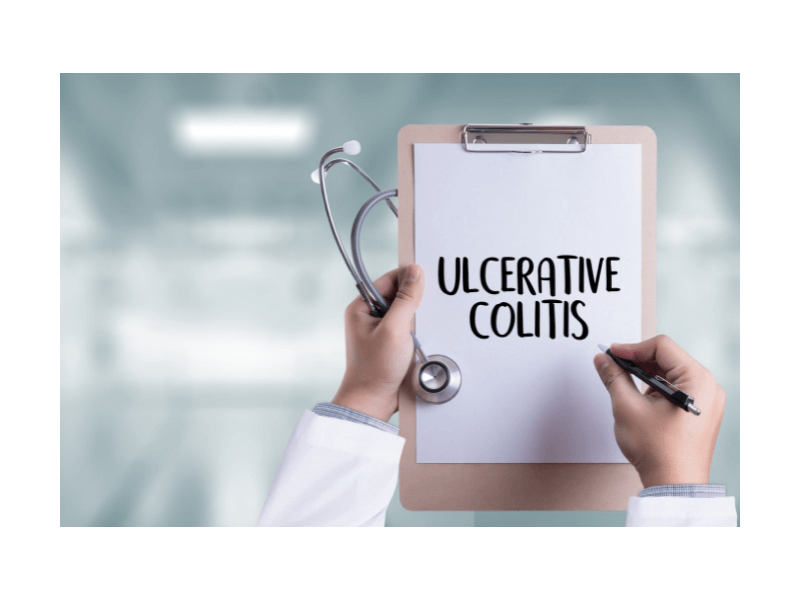Ulcerative Colitis (UC) is a long-term inflammatory bowel disease (IBD) that causes inflammation in the large intestines. Inflammation starts in the rectum and slowly spreads to the colon.
If you have UC, the affected areas become inflamed with ulcers (small sores) that produce pus. The amount and location of inflammation will determine the severity of the disease. Patients with UC will notice flare-ups (active diseases) when experiencing the worst symptoms.
When you have UC, you may notice some or all of the following symptoms:
- Diarrhea
- Blood in stool
- Weight loss
- Reduced appetite
- Fatigue
- Frequent bowel movements
- Stomach pain
When medical personnel treat ulcerative colitis, their goal is usually to achieve remission.
So what are the signs of ulcerative colitis remission?
Before learning about the signs, let’s first look at the diagnosis and treatment of UC.
Diagnosis and Treatment of Ulcerative Colitis
When it comes to diagnosing ulcerative colitis, your doctor will use endoscopic procedures and tissue biopsy. According to the National Center for Biotechnology Information, half of the people diagnosed with the condition only show mild symptoms, while others experience extreme symptoms. Patients with Ulcerative Colitis can also develop conditions such as arthritis, liver disease, eye inflammation, and osteoporosis.
Since there is no cure, treatments usually involve managing inflammation through drugs, nutrition therapy, and sometimes surgery. There are several drugs involved in the treatment of UC. However, the type of drug prescribed for your condition will depend on the severity of the disease. While some drugs work well for some patients, they may not work well for others.
There are two main categories of drugs that treat UC:
- Immune system suppressors
- Anti-inflammatory drugs
Both drugs work by minimizing and preventing inflammation or suppressing the immune system.
Medical nutrition therapy is an additional treatment route that can work alongside medications to help improve outcomes, increase energy and improve quality of life. Medical nutrition therapy might include treating nutrient deficiencies, modifying the diet, and adding in evidence-based supplement support. Modifying the diet can help to reduce symptoms and even decrease inflammation.
Medical nutrition therapy for IBD can only be given through a licensed dietitian. Although many people advise on nutrition in the online space- it is illegal to provide MNT without proper licensure. Ideally, it’s best to find a dietitian specialized in IBD for the best outcomes.
What is Ulcerative Colitis Remission?
Ulcerative Colitis is a chronic condition that stays with you for life. However, taking UC treatments and medications can help improve your condition or make it manageable. If the prescribed medications and treatment are working, the disease can stay in remission for a long time.
If you want to stay in remission, you need to stay on your treatment plan even after remission to prevent flare-ups.
You can experience partial or complete remission. Partial remission means that the treatment has cleared some of the symptoms, while complete remission means that all the symptoms have cleared up.
To experience complete remission means the disease is not interfering with your daily work. Remission can last for weeks, months, or years as long as your medication/treatment is working and there are no triggers for flare-ups.
Types of Ulcerative Colitis Remission
The best outcome you can hope for when struggling with UC is being in remission. Here are five distinct types of ulcerative remission:
Clinical Remission: This type of remission occurs when you are not experiencing UC symptoms and may feel better. However, you can still experience some of the symptoms such as bloating, constipation, and diarrhea.
Biochemical Remission: Biochemical remission occurs when no signs of inflammation are shown on blood and stool tests.
Endoscopic Remission: Intestinal lining tests show no signs of inflammation.
Histologic Remission: Both endoscopic and clinical remission come back negative for Ulcerative Colitis.
Surgical Remission: This type of remission occurs after surgery.
How to Know if You Are in Ulcerative Colitis Remission
Achieving remission for UC can be a challenging process. It can also be challenging to determine if you are in remission since you can have symptoms without inflammation present and you can also have relatively no symptoms and still have inflammation! Whichever the case, here are some tips on how to know if your treatments are working.
#1. You Begin Doing the Things You Used to Do
You will know the treatment and medication are working when you start doing the things you enjoyed doing before. For instance, going out or taking on extra activities. As long as you are maintaining your treatment plan and avoiding triggers, there should be no problem with doing the things you enjoyed doing before.
#2. No Pain or Fatigue
A lot of patients report not experiencing pain or fatigue. Some have reported taking on tasks and activities that require a lot of mental energy, dedication, and networking without getting fatigued easily.
Another symptom that the treatment is working is that you don’t bleed or feel pain when passing stool, according to Sunanda V. Kane, MD, a gastroenterologist at Mayo Clinic. Also, if you have fewer stools each day, without the urgency to go, then the condition is improving.
#3. You Begin Transitioning Back to Your Normal Life
You will know you are going into remission when life seems interesting again. Some patients have reported that the extra bathroom breaks, lack of sleep, and appetite are now a thing of the past. According to Jeff Scott, M.D., a board-certified gastroenterologist, if you don’t have any active symptoms and you don’t need frequent contact with your doctor, then you are doing okay. Extreme symptoms that interfere with your life are an indication that the treatment plan is failing.
Even if symptoms are improved, it’s important to still check in regularly with your doctor to verify if you are in remission through bloodwork.
Lifestyle Changes and Tips for Staying in Remission
Even when you are in remission, you need to continue to stay on a treatment plan as advised by your physician and dietitian. In addition to your treatment plan, the following are also very helpful:
#1. Adopt an IBD Focused Dietary Approach
It’s important to acknowledge that many people with IBD have valid food fears. Often without adequate guidance, IBD patients often eliminate foods based on symptoms alone leading to over-restricting and malnutrition. It doesn’t need to be this way though- you can expand the diet to a diet that supports your IBD without triggering symptoms. If you are lost on how to do this- reach out to an IBD-focused Dietitian.
Some of the foods you should include in your Ulcerative Colitis diet include:
- Healthy fats, e.g., avocado and olive
- A diverse variety of fresh vegetables and fruits
- Tolerable starchy vegetables like squashes
- Whole grains like quinoa, oats, brown, black, and red rice
- Legumes like tofu, black beans, chickpeas, northern beans, etc
- Fatty fish like salmon, halibut, herring, etc
If the fiber-rich foods above confused you- check out our recent blog on the topic.
UC symptoms get worse when you consume certain types of foods. The foods that may worsen your symptoms include:
- Fast foods
- Spicy foods
- Caffeinated drinks such as sodas
- High sugary foods
- Sugar substitutes
- Alcohol
- Dairy
- Myric Acids (coconut oils, palm oil)
- Red and processed meats
You can also try dietary supplements along with your prescribed medication.
#2. Engage in Regular Low Impact Physical Movement
Low impact physical exercise is known to have anti-inflammatory effects which help improve the symptoms of UC. Workout sessions such as weight training, cardio, or yoga help promote healthy well-being and counteract complications brought by the disease.
If you are in a flare, it’s best to opt for the lowest impact exercises like yoga or walking since pushing yourself too far can cause more harm than good. Avoiding high-intensity workouts is important if you are trying to recover from an IBD flare.
#3. Control and Manage Stress
If you’re under any stress, you need to control, manage or avoid it. When you’re stressed, your body triggers the release of chemicals such as cytokines which can attack your immune system and lead to inflammation.
If you need help managing things around you, make sure you ask for help from relatives or friends. While we can’t eliminate stress altogether, we can change our relationship to it by bringing in stress resilience tools to help ourselves cope like meditation, yoga, walking, or calling a friend.
#4. Go for Regular Checkups
Your physician will schedule regular checkups to monitor your progress. You need to attend all check-ups because it can help your doctor detect any flares or side effects of the medication you are taking.
It’s important to also check in with your IBD dietitian as well to monitor dietary triggers or potential deficiencies that can put you more at risk for flares.
Get Help for UC from a Dietitian Today
If you are struggling with staying in remission or are frustrated by the kind of treatment you’ve been undergoing, then book a consultation with us from the comfort of your home since we work virtually.
You will get help with your UC and reach remission faster with the help of an experienced Crohn’s and Colitis Dietitian.




0 Comments
Trackbacks/Pingbacks